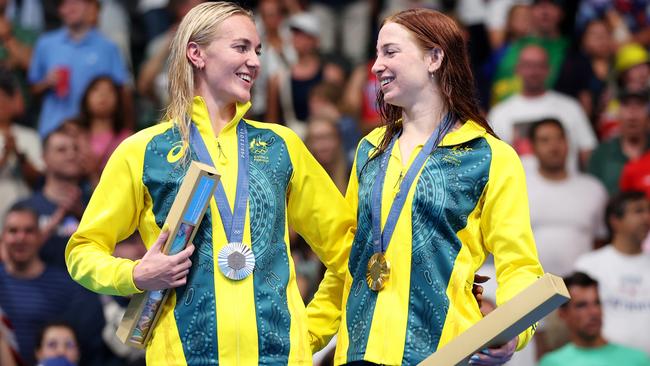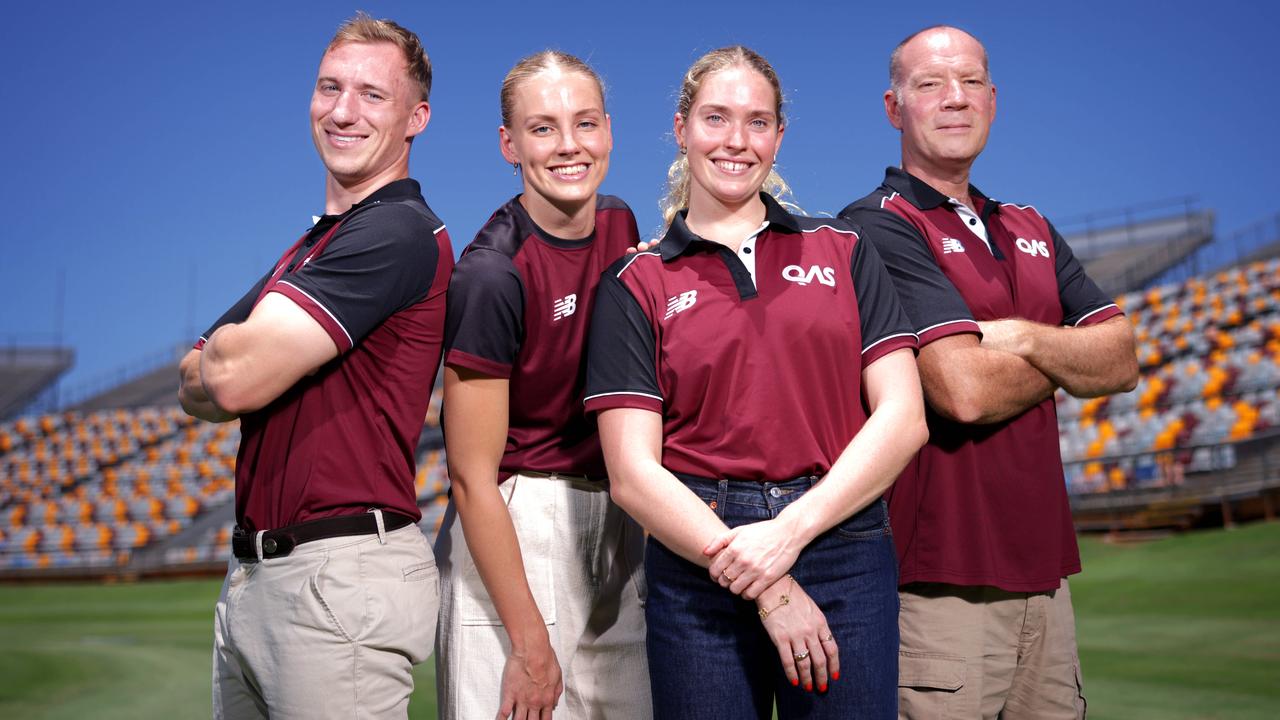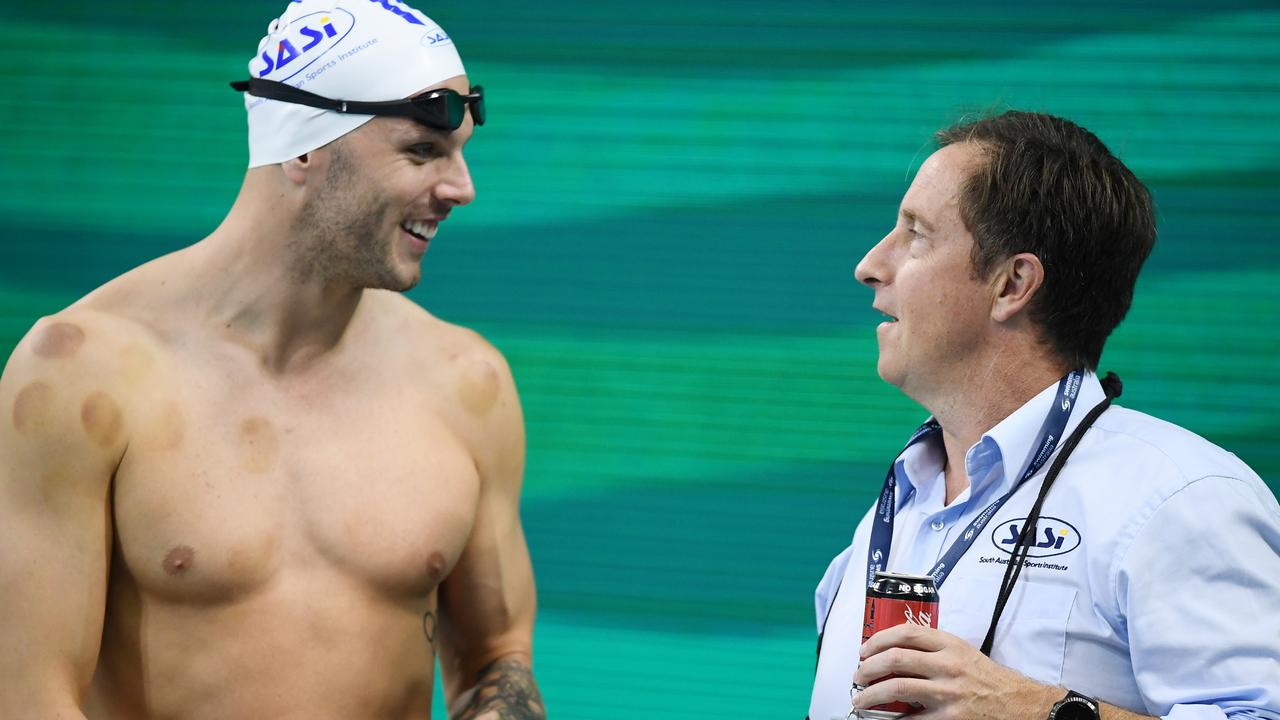Chalk and cheese, rivals and friends: nation celebrates with ‘inseparables’ Mollie O’Callaghan and Ariarne Titmus
Mollie O’Callaghan and Ariarne Titmus are not quite besties and the rivalry is genuine, yet rarely does an Olympic presentation ceremony transcend personal glory and gloating.

Swimming
Don't miss out on the headlines from Swimming. Followed categories will be added to My News.
Mollie O’Callaghan invited Ariarne Titmus to the highest step of the Olympic podium. Australian mateship at its finest.
They’re not quite besties and the rivalry is genuine but, when all was said and done and O’Callaghan had won the 200m freestyle at the Paris Olympics, she shared her crowning moment with the vanquished.
It was the best of Australian sport. You have a crack, beat the world, leave it in the water. They might have knocked the top off a cold one in less professional times. Arm in arm, they created Australia’s most memorable podium scene since Peter Norman wore his Olympic Project for Human Rights badge in support of the black power salute from African-Americans Tommie Smith and John Carlos at Mexico City in 1968. The circumstances on this exhilarating night in Paris were completely different, of course, and yet rarely does an Olympic presentation ceremony transcend personal glory and gloating.
They’re chalk and cheese as young women. The 20-year-old O’Callaghan is shy, flighty and skittish. A fighter with a blue-collar background. The 23-year-old Titmus oozes an intimidatory calmness and control.
They train together under their increasingly accomplished coach, Dean Boxall, but they don’t really. Boxall puts O’Callaghan with his sprinters. Titmus is in a separate middle-distance group.
O’Callaghan and Titmus are friendly and without necessarily catching up for a cuppa and chinwag. It’s a cordial relationship and O’Callaghan covered herself in glory, more glory, by selflessly involving Titmus in her celebrations. We’ve seen Bradman’s Invincibles. Post-race in Paris, O’Callaghan and Titmus were inseparables.
“It’s such an honour to be with everyone and compete against Arnie,” O’Callaghan said. “She’s an absolute gun. She races like an absolute beast. It’s an honour to train alongside her and have such a great team around us.
“You’ve got to accept the challenge at the end of the day. You can either run or you can either fight. I chose to fight.”
What a race. O’Callaghan versus Titmus was world champion versus Olympic champion. Recent world record holder versus current holder. Australian versus Australian. Stablemate versus stablemate. It did not disappoint.
O’Callaghan lost the battle to Titmus at the Australian trials but she won the war at La Defense Arena. She was fifth halfway then powered home as theatrically as the famously late-charging Winx used to do at Royal Randwick.
O’Callaghan was so nervous before the race she was shaking like an autumn leaf. She finished so fast she might have been riding the steel horse from the opening ceremony on the River Seine. O’Callaghan touched the wall in an Olympic record time of 1min53.27sec to beating Titmus (1:53.81) and Hong Kong’s Siobhan Haughey (1min54.55sec).
Then came the podium moment. She tried to hold back the tears. She failed to do so. “I’ve just got to keep it straightforward,” she said with a quivering bottom lip. “I’ve got the 100 tomorrow so I’ll let it sink in at the end. But seeing my mum and dad, that sort of hit me a little bit. I kind of swim mainly for them. Um …”
Um, the dear thing wept. “They put a lot of time and dedication into my swimming when I was a child,” she said. “I probably shouldn’t cry now. It’ not the end of the meet. I’m just really fortunate to have them with me.”
Chalk versus cheese. Freakishly talented nervous wreck versus Arnie, nicknamed “The Terminator”. They joined elite company. One-two Olympic finishes for Australia are rare. O’Callaghan and Titmus joined high company, starting with Fanny Durack and Mina Wylie at Stockholm in 1912; including Dawn Fraser and Lorraine Crapp at Melbourne in 1956; John Konrads and Murray Rose at Rome in 1960; Grant Hackett and Kieren Perkins in the 1500m at Sydney in 2000. Chalk and cheese became Australia’s first gold/silver combo since Thorpe beat Hackett in the 400m freestyle at Athens in 2004.
Standing next to O’Callaghan, Titmus blinked away tears of her own. “These are happy tears,” she said. “You live for these moments. I know what it’s like to be Olympic champion and I’m happy Molly gets to feel that now.”
On sharing the gold medallists’ lofty perch, she added: “I felt like, up there, that I’d won as well. It’s great to do it with a teammate. It’s really special to have this in our country. I’m so proud of this era of swimming. I’m trying to keep my emotions together but it’s really hard. We work so hard for this, to experience this. It really brings everything to the surface and I’m over the moon with silver.”
O’Callaghan’s first individual Olympic gold medal was her fourth overall. She’s the youngest Australian to have so many; Ian Thorpe and Murray Rose were 21. There’s more to come for Mollie O. She’ll join Titmus in the unbeatable 4x200m freestyle relay and appear in the 4x100m medley relay and mixed medley relay. Titmus has the 800m to come, another battle royale against Katie Ledecky, this time in the American’s preferred event.
Boxall was an unusually subdued figure when O’Callaghan was scrapping and clawing to the wall, with her lungs busting, and her heart bursting, and her legs delivering the biggest and most powerful kick in the sport.
Accustomed to going berserk, Boxall merely folded his arms across his chest before rather politely raising his hands and clapping. He had to keep his cork in the bottle. He was like a father with two daughters in the same race. He couldn’t be too happy for O’Callaghan, because Titmus lost. He couldn’t be too disappointed for Titmus. Because O’Callaghan won.
“To manage this and have the two fastest girls in the world is a credit to him,” Titmus said.
Boxall has become one of Australian sport’s finest, most intriguing and most successful mentors. The Launceston-based Titmus joined his St Peters Western stable in Brisbane as a 15-year-old. O’Callaghan, from Logan, was 15 when she joined Boxall’s stables of superfishes.
An hour before their final, the real race of the century, Boxall gave O’Callaghan instructions on how to beat Titmus. Then he gave Titmus advice on how to beat O’Callaghan. What a delicate juggling act. What an accomplishment to pull it off to the extent that the winner shared her crowning moment with the vanquished.
“I think he should be so proud of his efforts,” Titmus said. “He is a brilliant coach. I believe he’s the best in the world. It’s not just us. Opening night, he contributed to every medal that we won as a coach. I just feel very blessed to have him in our corner. If you want anyone backing you, it’s Dean, and we will be forever grateful for him.”
It’s hard not to keep thinking of the similarities between O’Callaghan and Winx. The pre-race skittishness. The extraordinary natural gift of speed and the fighting, last-gasp, hair-raising, soul-stirring racing style that made Winx the ride of a lifetime. You fear she’s too far back and then whammo. Among all these champion Australian swimmers, it’s O’Callaghan who most captures the hearts of the public.
“There are no words to explain it,” O’Callaghan said. “I had a few tears. And a few tears with Arnie. It’s just great to race alongside my teammate and be on the podium with her. I’m always striving for more and I always put a lot of pressure on myself. My expectations are very high. That was an amazing race and I’m always wanting that little bit more. I just had to go with Dean and trust him, knowing what to do and what’s best. There’s less pressure now and I get to swim freely. To be honest, I did it for the country. I didn’t do it for myself. I’m racing for all these people.”
Originally published as Chalk and cheese, rivals and friends: nation celebrates with ‘inseparables’ Mollie O’Callaghan and Ariarne Titmus



